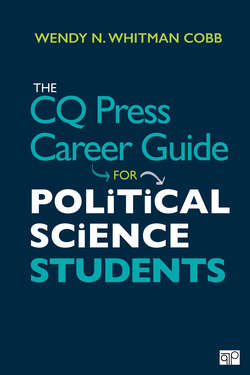Читать книгу The CQ Press Career Guide for Political Science Students - Wendy N. Whitman Cobb - Страница 9
На сайте Литреса книга снята с продажи.
Working for Elected Officials
ОглавлениеElected officials can’t do it alone. They rely on a small army of staff members to support their activities and foster relationships with constituents and other politicians. Every member of Congress is allocated a budget with which to build their office and attract personnel, allowing them to decide how many staffers to hire and for what functions. You could be an advisor on specific policy areas or a communications aide, assisting members of Congress with outreach to the public, the media, and their constituents. You will also assist members with researching and creating legislation, negotiating with other members of Congress, and being a liaison with committees and their work.
On the home front, members of Congress create offices in their districts and states to facilitate contact with their voters. Part of the work of these staff members is something called constituent service. Whenever you are having a problem with some area of government, be it Social Security, immigration, or the military, you can contact your member of Congress, and he or she will attempt to intercede on your behalf. This valuable function not only assists voters with their everyday problems but makes it more likely that they will vote for that congressman or woman in future elections. This is just another task you could be hired to do when working for members of Congress.
Outside of members’ offices, Congress requires a multitude of others to get their work done. Staff members are hired for individual committees, and party organizations also hire staff. For example, the Judiciary Committee in either the House or the Senate hires people whose sole job is to work on issues related to that committee. Both the Democratic and Republican caucuses and their respective campaign committees also hire staff to coordinate activities among their members. These types of jobs require good communications skills, the ability to process and understand political issues, and the ability to work together as part of a team. Although many of these jobs come with hard work and long hours, you’ll have the opportunity to see the political and legislative process up close and personal.
Congress also has nonpartisan organizations that assist members in getting their work done. The Congressional Budget Office (CBO) and the Government Accountability Office (GAO) are two such agencies. The CBO provides independent, nonpartisan budgetary information to members to help them in the annual budgetary process. It provides estimates of annual revenue and program costs and calculates the official cost of pending legislation. The GAO performs investigations into the performance and activities of executive branch agencies. Members of Congress can request that the GAO investigate certain policies, programs, or organizations and the GAO will report back its findings to the member and the rest of Congress. These organizations provide several job opportunities for political science majors who are interested in the nuts and bolts of budgetary and government policy and can be effective in their ability to communicate.
Job opportunities also abound in the White House, where you can work on domestic policy, communications, outreach and the media, working with the Congress, and so much more. While we normally only see a few select top advisors on TV representing the president, there are hundreds more individuals working in the West Wing organizing everything the White House and the president do. The White House also contains agencies like the Office of Management and Budget, which assists the president in constructing his or her annual budget. Like the Congress, White House staffers are likely to spend long hours at the office, but it doesn’t hurt that the office is the White House.
Don’t forget about the elected officials at the state and local level. Members of state legislative bodies in all fifty states require the help of others to complete the job they were elected for, and many of the same responsibilities that members of Congress give to their staff members are also reflected in state legislatures. This means that by working for a state legislator, you have the opportunity to contribute to issues that are likely to be important to your fellow citizens and have a far more immediate impact. For example, the state of California has an economy that rivals some of the largest economies around the world; the immediacy of monetary policy and government spending makes it so that the actions of state legislators are likely to impact Californians quite directly. State governors also require a large amount of assistance in formulating policies and carrying them out. Since state governments carry out most of the day-to-day activities of governing, these types of jobs can have a very real impact on your community and state.
